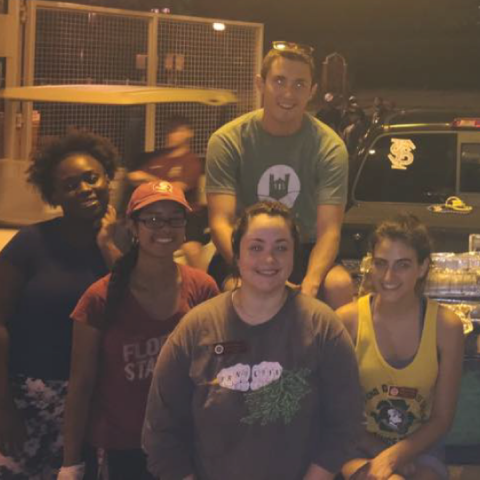Greening Our Community: Too Much Food – Too Little Consumed

At a staggering forty percent, food is the single largest source of waste in the United States. Statistically speaking, this is enough food to feed over twenty-five million Americans. As students who are fortunate to attend a university so deeply rooted in community service and ardency for social equality, we took it upon ourselves to attempt to bridge the gap between food waste and food insecurity in Leon County.
The establishment of our chapter of Food Recovery Network (FRN) at Florida State University three month ago has already yielded far greater success in fighting food waste on campus than we could have ever initially anticipated. FRN strives to eliminate food waste at universities nationwide by recovering leftover food from eating establishments on campus and donating this excess food to charities and shelters who provide accommodations for those in need.
Food Recovery Network has progressed from a sheer concern for the well-being of others to an organization with chapters in over 100 colleges, reaching 26 different states (http://www.foodrecoverynetwork.org/). Since its implementation in 2011, FRN chapters have salvaged over 520,000 pounds of leftover food through the volunteerism and teamwork of students who are passionate about allocating otherwise perishable goods to charities and shelters that share the same desire to bring equality to every member in the community. Of those 520,000 pounds nationwide, FSU’s Food Recovery Network has contributed a total of 1,975 pounds in just three months of being an active, registered student organization.
The arduous, but gratifying process of establishing a chapter at FSU came as the result of the realization of an underlying problem that seems to be ubiquitous throughout all college campuses: We have too much food and yet too little of it is consumed.
After receiving the consent of Aramark – Florida State University’s foodservice provider – and joining forces with Sustainable Campus, FRN began actively recruiting members with the promise of making a difference in food insecurity within Leon County.
As of today, we have 105 members who are dedicated to executing weekly food recoveries and dropping food off at three different organizations in Tallahassee (Hope Community, The Shelter, and the Good Samaritan Network) through 15 separate weekly food recoveries from various locations on campus.
Additionally, we have facilitated two recoveries after FSU home football games, each of which garnered over 400 pounds of food to donate. With the partnership of Sustainable Campus and Seminole Dining, the smooth establishment of a chapter here at FSU has accrued for us both quantitative accomplishments and gratifyingly invaluable secondary effects of paying it forward within our community. In the future we look to expand our chapter even further with increased community outreach and the service of volunteers who seek to find meaning and fulfillment in assisting people in need.
Written by Gabrielle Maynard, Communications major, and Allison Young, Social Work major at Florida State University. Contact them through Elizabeth Swiman, Director of Campus Sustainability at FSU, at ESwiman@admin.fsu.edu. FSU is a member of the Capital Area Sustainability Council. Visit www.sustainabletallahassee.org for information about the Capital Area Sustainability Council, Sustainable Tallahassee, and upcoming sustainability related calendar events.
